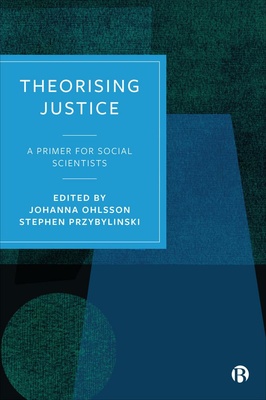Przybylinski co-edits new book aimed at helping social scientists theorize justice
October 31, 2023
 A new volume centered on theorizing justice for social scientists, co-edited by Stephen Przybylinski, is now available. Theorising Justice: A Primer for Social Scientists brings together various schools of thought on justice, connecting normative and philosophical theories of justice with more empirically focused approaches emerging today in the social and political sciences and policy scholarship.
A new volume centered on theorizing justice for social scientists, co-edited by Stephen Przybylinski, is now available. Theorising Justice: A Primer for Social Scientists brings together various schools of thought on justice, connecting normative and philosophical theories of justice with more empirically focused approaches emerging today in the social and political sciences and policy scholarship.
Przybylinski, an assistant professor with the Department of Geography, Environment and Spatial Sciences at Michigan State University, originally began considering such a volume while completing a postdoctoral position at Uppsala University in Sweden. "I was working with a really great team of scholars whose interests span the social, political, and physical sciences. Part of our work was to develop surveys of the main justice literature that pertain to the social and environmental sciences," explained Przybylinski. "As we began workshopping and producing these papers for the other working groups, we thought we had come up with a fairly useful way of interpreting the massive amount of scholarship on justice that exists."
The volume aims to illustrate how mainstream justice theories, such as liberalism, and critiques of mainstream justice theories, such as post-colonial or feminist approaches, shape our responses to issues like climate, energy, environment, and spatial injustice. "We really want to introduce students to the concept of justice in far more detail than they may understand it intuitively, especially as it is applied within social and environmental sciences," said Przybylinski. "We don't develop a unique theory of justice in the book, but instead hope to show students and scholars that there are different approaches to justice that they can usefully apply to their research."
 The volume, co-edited with Johanna Ohlsson, concludes by providing a unique framework for how to synthesize theories of justice across many fields of study. Przybylinski explained that this approach offers a comprehensive toolkit to deepen our understanding of justice in its many dimensions and believes it will be helpful for students, scholars, and practitioners concerned with valuing justice normatively and in its social or political contexts.
The volume, co-edited with Johanna Ohlsson, concludes by providing a unique framework for how to synthesize theories of justice across many fields of study. Przybylinski explained that this approach offers a comprehensive toolkit to deepen our understanding of justice in its many dimensions and believes it will be helpful for students, scholars, and practitioners concerned with valuing justice normatively and in its social or political contexts.
Przybylinski hopes readers will find relevance in the applied theories of justice. This is especially true of the chapters concerned with climate justice, environmental justice, energy justice, spatial justice, and landscape justice that move readers through the histories and debates in these schools of thought and help show why critical perspectives on these topics matter to the social and environmental sciences.
Theorising Justice: A Primer for Social Scientists is open access and now available as a free download.

